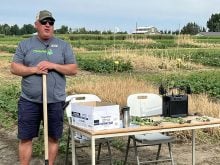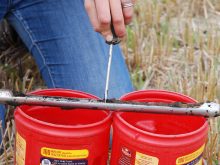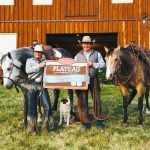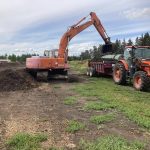As prime minister Stephen Harper gave a triumphant speech to Conservative party national convention delegates June 10, rural MPs were scattered throughout the audience listening for signals on government priorities.
Late in the speech, Harper affirmed the government’s intention to fulfill a promise to reform the Canadian Wheat Board, eliminating the single desk.
“Yes,” said Saskatchewan MP Randy Hoback as he stood in the crowd and applauded the reference.
Later in an interview, Hoback said the CWB issue was a huge deal with rural delegates. When the government made clear it is a priority, much of the air went out of the agriculture policy balloon at the convention.
Read Also

AI expected to make itself felt in food systems
Artificial intelligence is already transforming the food we eat, how farmers produce it and how it reaches the consumer, experts say
“It was the major issue for many delegates I talked to and a promise to deal with it made most rural delegates happy,” Hoback said.
In fact, there was no agricultural debate in public sessions during the convention, despite the fact the Conservative rural base represents most Canadian farmers outside Quebec.
At a private policy workshop, delegates considered a resolution on agriculture principles that suggested more stringent inspection of imported food, a balance between financial responsibility and farm support and a rule that “agriculture policy must be developed only in consultation with the agricultural producers.”
The resolution was not chosen for consideration at the later public policy debate on the closing day of the convention June 11. It lasted less than 90 minutes.
“I guess we’ve fixed everything,” rural Alberta MP and minister of state for finance Ted Menzies quipped later when asked about the lack of agricultural policy debate.
But rural Conservative MPs at the convention said there was lots of agriculture talk in the corridors.
“The general buzz is that there is optimism out there, that many sectors are doing well,” agriculture minister Gerry Ritz said in a convention floor interview.
“Farming is a business and people are seeing that for the moment at least, things generally are going well.”
However, southern Saskatchewan Conservative MP David Anderson said there was convention corridor talk about continued seeding difficulties on the Prairies. Anderson said the ground is so wet on his own farm he had his mustard seeded from an airplane.
“But really, you don’t hear a lot of negativity these days and I think that is one reason it hasn’t been a big issue on the floor,” he said.
In his keynote speech to the convention, prime minister Harper vowed to act on promises about CWB reform and changes to the Senate.
Rural delegates among the 2,200 gathered in Ottawa saw it as Harper sealing the deal on issues that have been core Conservative promises for the past four elections.
One of the biggest ovations for Harper came when he promised abolition of the long-gun registry will be part of a package of criminal justice bills to be introduced within 100 sitting days in the new Parliament.
“As we focus on the fight against criminals, we shall work to put government on the side of victims and law-abiding citizens,” he said.
“And so, we will bring in legislation this fall to finally scrap the costly and inefficient long-gun registry. Count on it.”
Delegates rose to their feet and cheered.
















